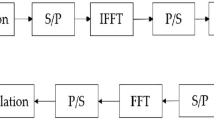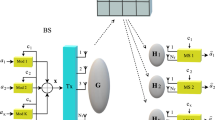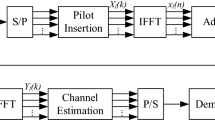Abstract
Multiple-input multiple-output (MIMO) systems implement multiple antennas to enhance diversity gain of wireless communication systems. Earlier work in generalized selection combining (GSC) focused on single-input multiple-output systems without space–time coding. Recently, with the aid of space–time coding, diversity gain became possible using multiple transmit antennas. In this paper, GSC scheme is applied to orthogonal space–time block codes (OSTBC) for 4 × L and 8 × L MIMO systems with various modulation schemes like M-PSK, M-QAM, and M-PAM in a slowly fading Rayleigh channel. The performance of GSC for half rate-full diversity, full rate-full diversity, and 3/4 rate-full diversity OSTBC is discussed and compared. Approximate closed-form expressions for symbol error rate (SER) and ergodic capacity for various OSTBCs are derived. The impact of channel estimation errors on system performance is also examined. Approximate closed-form expressions for performance bounds on SER and ergodic capacity of GSC for MIMO OSTBC are also derived and plotted.










Similar content being viewed by others
References
Alamouti, S. M. (1998). A simple transmit diversity technique for Wireless communications. IEEE Journal on Selected Areas in Communications, 16(8), 1451–1458.
Deng, Y., Wang, L., Kim, K. J., & Duong, T. Q. (2015). Generalized selection combining for cognitive relay networks over Nakagami-m fading. IEEE Transactions on Signal Processing, 63(8), 1993–2006.
Li, W., Beaulieu, N. C., & Chen, Y. (2009). Generalized receiver selection combining schemes for Alamouti MIMO systems with MPSK. IEEE Transactions on Communications, 57(6), 1599–1602.
Lozano, A., & Jindal, N. (2010). Transmit diversity vs. spatial multiplexing in modern MIMO systems. IEEE Transactions on Wireless Communications, 9(1), 186–197.
Yu, X., Xia, X. G., & Leung, S. (2016). Performance analysis of MIMO systems with arbitrary number of transmit antenna selection and OSTBC in the presence imperfect CSI. China Information Sciences, 59, 1–16. doi:10.1007/s11432-015-5476-6.
Cao, L., & Beaulieu, N. C. (2004). Exact error-rate analysis of diversity 16-QAM with channel estimation error. IEEE Transactions on Communications, 52(6), 1019–1029.
Zhang, W., & Tellambura, C. (2010). Performance of joint transmit and receive antenna selection with orthogonal space-time coding. IEEE Transactions on Vehicular Technology, 59(5), 2631–2635.
Ma, Y., Schober, R., & Pasupathy, S. (2005). Performance of M-PSK with GSC and EGC with Gaussian weighting errors. IEEE Transactions on Communications, 54(1), 149–162.
Kaviani, S., Tellambura, C., Krzymieri, W. A. (2007). On the performance of transmit antenna selection with OSTBC in Ricean MIMO channels. In CNIT Thyrrenian symposium on wireless communications, Lecture series in Springer Science, pp. 39–50.
Qahtani, F. S., Gurung, A. K., Zummo, S., Mahmoud, S., & Hussain, Z. (2011). Performance evaluation of generalized selection combiner over slow fading channels with estimation errors. Wireless Personal Communications, 56(2), 207–236.
Yeoh, P. L., Elkashlan, M., Yang, N., da Costa, D. B., et al. (2013). Unified analysis of transmit antenna selection in MIMO multirelay networks. IEEE Transactions on Vehicular Technology, 62(2), 933–939.
Kulkarni, M., Choudhary, L., Kumbhani, B., & Singh, R. (2014). Performance analysis of transmit antenna selection with maximal ratio combining and orthogonal space-time block codes in equicorrelated Rayleigh fading multiple input multiple output channels. IET Communications, 8(10), 1850–1858.
Coskun, A. F., & Kucur, O. (2015). Analysis of transmit antenna selection/orthogonal space-time block coding with receive selection and combining in the presence of feedback errors. Wireless Communications and Mobile Computing, 15(17), 2065–2078.
Li, W., & Beaulieu, C. (2006). Effects of channel estimation errors on receiver selection combining diversity for Alamouti MIMO systems with BPSK. IEEE Transactions on Communications, 54(1), 169–178.
Duman, T. M., & Ghrayeb, A. (2007). Coding for MIMO communication systems, Wiley, Chichester, England, eq. (4.34) on page 79.
Jafarkhani, H. (2005). Space-time coding theory and practice (pp. 70–84). NY: Cambridge University Press.
Bickel, P. J., and Doksum K. (1977) Mathematical statistics: Basic ideas and selected topics (2nd ed., Vol. 1), Prentice Hall, Upper Saddle River, NJ 07458, p. 485.
Win, M. Z., & Winters, J. H. (2001). Virtual branch analysis of symbol error probability for Hybrid Selection/maximal ratio combining in Rayleigh fading channels. IEEE Transactions on Communications, 49(11), 1926–1934.
Gradshteyn, I. S., & Ryzhik, I. M. (2000). Table of integrals, series and products (6th ed.), eq. (2) of section 3.326 on page 334.
Author information
Authors and Affiliations
Corresponding author
Rights and permissions
About this article
Cite this article
Bhaskar, V., Kandpal, D. Generalized Selection Combining Scheme for Orthogonal Space—Time Block Codes with M-QAM and M-PAM Modulation Schemes. Wireless Pers Commun 94, 1619–1641 (2017). https://doi.org/10.1007/s11277-016-3702-1
Published:
Issue Date:
DOI: https://doi.org/10.1007/s11277-016-3702-1




